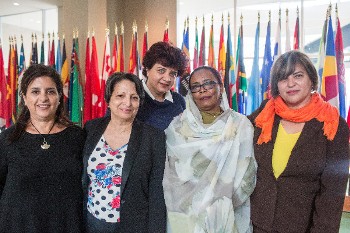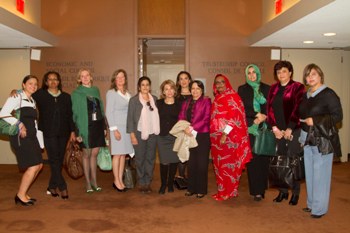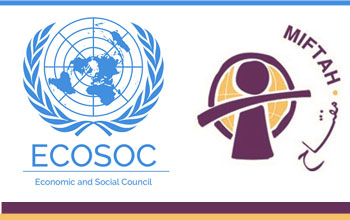
October 28 – Women leaders from the Arab Regional Network on Women, Peace, and Security (ARNWPS) lobbied for women’s participation, inclusion and protection at high-level discussions on the impact of conflict of women worldwide at the United Nations in New York. They concluded that fifteen years after adopting Security Council Resolution 1325 (SCR1325) on women, peace and security, critical gaps are still preventing achievement of sustainable peace in the Arab region.
In meetings with senior figures at the UN and a side event, the ARNWPS delegates set out the group’s four practical recommendations for the women, peace and security agenda:
- Efforts to increase women’s political and diplomatic participation need to be strengthened by the introduction of enforceable quotas.
- Women human rights defenders too often become the targets of violence; courageous women like Salwa Bughaighis and Fariha Al-Berkawi in Libya have been assassinated. The Security Council and international bodies must treat such targeted violence against women as a crime against humanity.
- International bodies should provide greater support and partnership at the community level.
- The global trade in arms fuels conflict and violence against women; the flow of weapons needs to be stemmed.
“Governments lack the political will to implement SCR1325 and women are dying as a result,” said Karama Founder and CEO, Hibaaq Osman. “If all the resolutions on women, peace and security were implemented, we would not be seeing the violence that is currently devastating women’s lives across the Arab region. The ARNWPS has presented recommendations that can have a positive impact on women’s lives.”
While SCR1325 has been a pivotal document in acknowledging the integral role of women in peace and reconciliation processes, its aims have not been fulfilled through action. The delegation met with international policymakers and media in New York in order to raise awareness of the situation for women living in conflict and under occupation and to build support for its four main recommendations.
"Sustainable peace requires us to address the root causes of conflict. Women have proven to be best at dealing with these issues and providing solutions,” said Jetteke Van Der Schatte Olivier, Manager of the Women on the Frontline Programme. “The international community should make women's rights part and parcel of their foreign and security policies, ensuring women are no longer overlooked, nor sidelined.”
Women across the region are facing horrible conditions as a result of conflict and occupation. “Women are denied all the rights they have as mothers in terms of hygiene, healthcare. Women are not in control of their own mobility,” shared Dr. Lily Feidy of the Palestinian Initiative for the Promotion of Global Dialogue and Democracy.. “If men are dead or the men are imprisoned or they are lost in action, it’s the women who suffer.”
Protection and rehabilitation are paramount in progressing toward long-term development and peace says Dr. Sima Bahous, UN Assistant Secretary-General and Regional Director of UNDP’s Regional Bureau of Arab States. “Governments must make firm commitments that those who target women and girls with violence in wars do not go with impunity, no matter how long it takes. We need to invest in the rehabilitation of women so they are reintegrated into society and we can ensure the social cohesion of society and ensure its development.”
Members of the ARNWPS from Iraq, Libya, Morocco, Palestine, Syria and Sudan emphasized the urgency of this situation from October 13-16 on the occasion of the high-level review of fifteen years of implementing SCR1325 throughout the globe. The delegation joined with representatives from Hivos’ Women on the Frontline Programme and Equality Now in discussing the impact of conflict on Arab women with President of the General Assembly Mogens Lykketoft and Administrator of the United Nations Development Programme (UNDP) Helen Clark. They also participated in side events hosted by the League of Arab States (LAS), the UNDP and the Permanent Mission of Ireland to the UN.
"Action to protect human rights defenders is paramount. We will follow up with the UN to ensure that what was discussed is put into action,” said Shelby Quast, Americas Director for Equality Now. “The women in this delegation face threats and intimidation every day, yet they persevere to champion peace and equality in their countries.”
Integral to forward progress are these deeper partnerships between international and regional bodies and local communities, a call that was reiterated by Ambassador Ahmed Fathalla of the LAS at the International Forum on Gender and Conflict, where Ambassador Fathalla noted, “We know we cannot move on this issue of women, peace and security only as governments or international organizations. We should always have the support of NGOs.”
Dr. Haifa Abu Ghazaleh, Under Secretary General of the LAS added, “The Arab League commends the efforts of the Arab Regional Network on Women, Peace and Security. It is important now for women to find new mechanisms to bring together the efforts of women’s organizations that contribute to peace and security."
While critical of the progress in implementing SCR1325, the ARNWPS delegation was optimistic about the dialogues they were able to engage in New York. Ms. Osman said, “The Global Study on SCR1325 demonstrates the necessity of women’s political and diplomatic participation. For anyone who might think that improving the lives of women is simply a matter of passing resolutions, the firsthand testimony of Arab women living through conflict will have left them in no doubt of the need for action to back up the good intentions. It should not be so unusual to see Arab women address the Security Council, to see them lead discussions on the conflicts facing their countries, for them to meet with senior figures at the UN. The way to make women’s participation and the goals of SCR1325 a reality is for groups like ARNWPS to bring women to the table.”
Karama launched the Arab Regional Network on Women, Peace and Security in 2013, in partnership with the UNDP and LAS, in order to foster greater commitment to measurable, timebound actions in the achievement of peace and equality. To date, only three countries in the region have launched National Action Plans, and credible forward progress has yet to be achieved on the ground.
“This peace and security network was birthed because of a need. Women were excluded from negotiations, statebuilding, all the dialogues taking place. We are the ones who live on an everyday basis in the conflict,” shared Fatima Outaleb, Director of the Women’s Shelter at Union for Women’s Action in Morocco. “Arab women hold the real message and we should not be excluded.”







